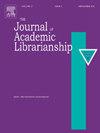Exploring the effects of informal feedback on organizational outcomes in academic libraries
IF 2.5
3区 管理学
Q2 INFORMATION SCIENCE & LIBRARY SCIENCE
引用次数: 0
Abstract
Informal feedback processes are becoming increasingly important across all organizations, including academic libraries. In addition to the dissatisfaction of employees with formal feedback, many issues with formal feedback processes have been studied and reported on over recent years. As informal feedback becomes more prevalent, it is critical for library organizations to understand elements of informal feedback processes and how they impact both employee and organizational outcomes. This study analyzes two important elements of informal feedback processes that are often undervalued, or sometimes lost, in formal feedback procedures: the employee-manager relationship (through supervisor source credibility) and individual employee characteristics (through feedback orientation). This online study of academic library workers (n = 231) analyzed how these informal elements relate to the organizational outcomes of affective commitment and turnover intention. Findings show supervisor source credibility and feedback orientation are both positively related to affective commitment. Only supervisor source credibility, the organization-related variable, was related to turnover intention. Practical implications for academic library managers and future research directions are discussed.
探讨学术图书馆非正式反馈对组织成果的影响
非正式反馈过程在包括学术图书馆在内的所有组织中变得越来越重要。除了员工对正式反馈的不满之外,近年来人们对正式反馈过程的许多问题进行了研究和报道。随着非正式反馈变得越来越普遍,对于图书馆组织来说,理解非正式反馈过程的要素以及它们如何影响员工和组织的结果是至关重要的。本研究分析了非正式反馈过程中经常被低估或有时在正式反馈过程中被忽略的两个重要因素:员工与经理的关系(通过主管来源的可信度)和员工个人特征(通过反馈导向)。本文对231名学术图书馆工作人员进行了在线研究,分析了这些非正式因素与情感承诺和离职倾向的组织结果之间的关系。研究发现,主管来源可信度和反馈导向与情感承诺均呈正相关。只有主管来源可信度这一组织相关变量与离职倾向相关。本文对高校图书馆管理的现实意义和未来的研究方向进行了讨论。
本文章由计算机程序翻译,如有差异,请以英文原文为准。
求助全文
约1分钟内获得全文
求助全文
来源期刊

Journal of Academic Librarianship
INFORMATION SCIENCE & LIBRARY SCIENCE-
CiteScore
5.30
自引率
15.40%
发文量
120
审稿时长
29 days
期刊介绍:
The Journal of Academic Librarianship, an international and refereed journal, publishes articles that focus on problems and issues germane to college and university libraries. JAL provides a forum for authors to present research findings and, where applicable, their practical applications and significance; analyze policies, practices, issues, and trends; speculate about the future of academic librarianship; present analytical bibliographic essays and philosophical treatises. JAL also brings to the attention of its readers information about hundreds of new and recently published books in library and information science, management, scholarly communication, and higher education. JAL, in addition, covers management and discipline-based software and information policy developments.
 求助内容:
求助内容: 应助结果提醒方式:
应助结果提醒方式:


